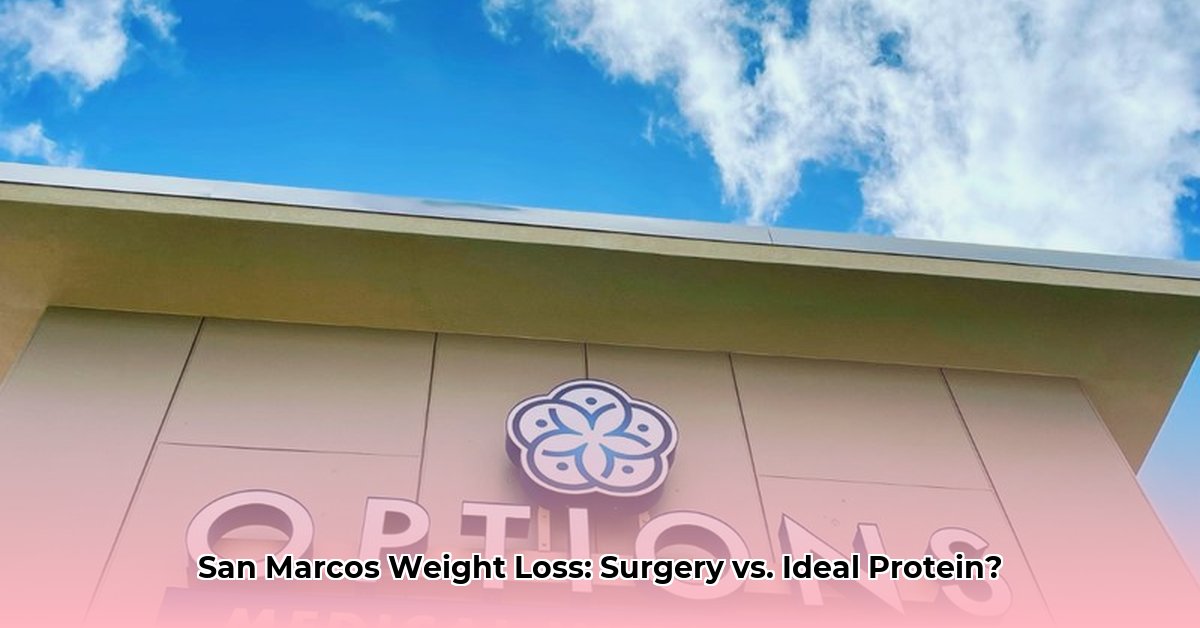
Choosing a weight loss strategy can feel overwhelming. This guide compares two popular options in San Marcos, Texas: bariatric surgery and the Ideal Protein program. We'll examine the pros, cons, risks, and long-term success rates of each, empowering you to make an informed decision.
Bariatric Surgery: A Significant Commitment
Bariatric surgery, a major medical procedure, involves altering your digestive system to promote significant weight loss. Common procedures include gastric bypass and sleeve gastrectomy. While offering substantial weight reduction, it's crucial to understand the associated risks and long-term commitment.
Pros of Bariatric Surgery
- Dramatic Weight Loss: Bariatric surgery often results in substantial weight loss, exceeding what's typically achievable through diet and exercise alone.
- Improved Health Outcomes: For individuals with obesity-related conditions (type 2 diabetes, hypertension), surgery can significantly improve or even resolve these issues. Dr. Anya Sharma, MD, bariatric surgeon at [Hospital Name], notes, "Bariatric surgery can be life-changing for individuals with severe obesity and related health complications."
Cons of Bariatric Surgery
- Surgical Risks: Inherent risks include infection, bleeding, and potential complications during or after the procedure. These risks must be carefully discussed with your surgeon.
- Extensive Recovery: Recovery time can range from weeks to months, requiring significant downtime before returning to normal activities.
- Long-Term Commitment: Maintaining weight loss post-surgery necessitates adherence to dietary changes, lifestyle adjustments, and regular follow-up care.
Bariatric surgery is generally recommended only for individuals with a high BMI and severe weight-related health problems. A thorough assessment by a medical professional is essential to determine suitability.
The Ideal Protein Program: A Gradual Approach
The Ideal Protein weight loss program utilizes a medically supervised, four-phase diet plan emphasizing high-protein intake and portion control. This program focuses on gradual, sustainable weight loss through dietary changes and lifestyle adjustments, offering a less invasive alternative to surgery.
Pros of the Ideal Protein Program
- Non-Invasive: Unlike surgery, the Ideal Protein program avoids surgical procedures, significantly reducing the risk of complications.
- Lower Cost: Compared to bariatric surgery, the program typically involves lower overall costs, excluding potential costs of specialized foods and doctor's visits.
- Lifestyle Focus: The program promotes long-term lifestyle changes, aiming to improve eating habits and support sustained weight management.
Cons of the Ideal Protein Program
- Strict Adherence: The program demands rigorous adherence to its dietary guidelines.
- Potential Nutrient Deficiencies: Close monitoring by a healthcare professional is crucial to prevent nutrient deficiencies due to strict dietary restrictions.
- Long-Term Maintenance: Sustained weight loss requires commitment to healthy habits and lifestyle changes beyond the program's duration.
Comparing Bariatric Surgery and the Ideal Protein Program
The table below summarizes key differences between the two approaches:
| Feature | Bariatric Surgery | Ideal Protein Program |
|---|---|---|
| Invasiveness | Highly invasive (major surgery) | Non-invasive (diet and lifestyle changes) |
| Weight Loss | Rapid, significant | Gradual, steady |
| Risk Level | High (surgical risks and complications) | Lower (potential nutritional deficiencies) |
| Cost | Very high (surgery, hospital, post-op care) | Moderate (program fees and specialized food costs) |
| Long-Term Success | Dependent on lifestyle changes and commitment | Dependent on continued healthy habits and maintenance |
| Eligibility | High BMI and weight-related health conditions | Generally suitable for various health conditions but individual assessments are highly recommended. |
Choosing the Right Weight Loss Path: A Personalized Approach
The optimal weight loss strategy depends on individual needs, health, and lifestyle. Following these steps can help:
- Comprehensive Assessment: Consult your physician for a complete health evaluation, discussing your weight loss goals, health history, and preferences. This is crucial for both options.
- Informed Decision: Based on your doctor's recommendations and personal circumstances, select the program most aligned with your individual needs.
- Preparation and Training: Follow any pre-operative instructions for surgery or begin the initial phase of the Ideal Protein program.
- Treatment and Monitoring: Attend all follow-up appointments to ensure successful progress and address any issues.
- Lifestyle Transformation: Sustainable weight loss requires long-term adherence to healthy habits, including balanced nutrition and regular exercise.
Disclaimer: This information is for educational purposes only and does not constitute medical advice. Always consult your physician before making any health decisions. They can help determine which path, if either, is best suited to your individual needs and health status. Individual results may vary.